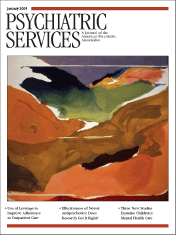Involvement in the Criminal Justice System Among Recipients of Mental Health Services After September 11
Abstract
OBJECTIVE: This study examined the relative risk of arrest among recipients of mental health services in Washington, D.C., during the 23 months before and the 13 months after the terrorist attacks of September 11, 2001, with the purpose of identifying any change in involvement with the criminal justice system after the attacks. METHODS: Analysis of anonymous data sets provided by the local mental health and police departments provided measures of risk of arrest, relative to that of the general population, for the approximately 5,000 people receiving mental health services each month. Interrupted time-series analysis was used to measure change in relative risk during the 36-month study period. RESULTS: Significant increases were noted in relative risk of arrest after September 11, 2001, among male, nonwhite young-adult recipients of mental health services. Significant change was evident for eight of the 12 age, gender, and racial groups used in this analysis. CONCLUSIONS: Disaster planning and response should include attention to involvement with the criminal justice system among recipients of mental health services. Future research should focus on the nature of the relationship between terrorism and arrest among service recipients.



